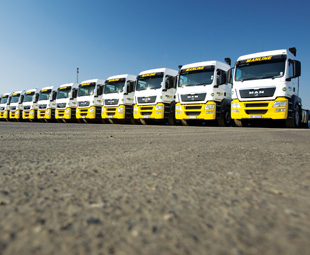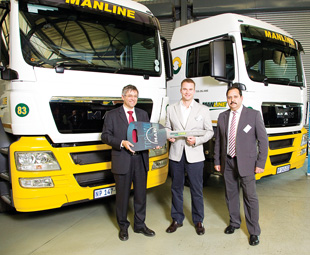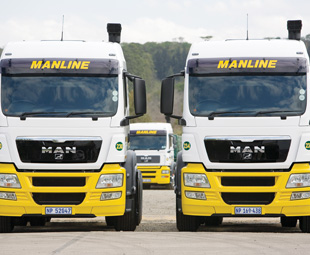Safety in numbers

With 65% of Manline’s fleet made up of MAN truck tractors, and more on order, it can be nothing other than a vote of absolute confidence and a supreme working relationship that keeps them tied together.
It must speak volumes for a manufacturer whose product comprises almost the entire fleet of a large and respected logistics operation. Pietermaritzburg-based logistics company, Manline, took delivery of 51 MAN TGS WW truck tractors in April to bring the total number of vehicles in its fleet to 403, of which 65% are from MAN. The 51 vehicles form part of a total 86-unit purchase – part of Manline’s four-year vehicle replacement cycle.
“We conducted three-month trials on truck tractors from several manufacturers to determine accurate lifecycle costs of each model,” says Neil Henderson, chairman and managing director of Manline Group. “Our buying criteria include purchase price, trade-in value, fuel efficiency, maintenance costs as well as cab comfort and driveability. We place huge value on what our drivers have to say about the trucks they drive and the MAN TGS WW is their truck of choice.”
This is not a new partnership, though. The German truck brand has formed the backbone of the linehaul transport arm of Manline since its inception in 1998. Henderson gives testimony to the power of solid, longstanding business relationships: “I grew up with the MAN brand and when I formed Manline in 1998, MAN was the obvious choice. We have tested a number of different trucks over the years and MAN products continues to provide us with the lowest total cost of ownership in our linehaul application. By the end of 2011 we will have taken delivery of 471 new MAN trucks over 14 years.”
 Comprising five divisions (Manline Freight, Manline Energy, Manline Distribution, Manline Africa and Timber24) specialising in the transport of general freight, black products, fuel, gas, chemicals and timber, the Manline Group offers a comprehensive supply chain solution to its customer base, from point of manufacture, to local distribution centres and to the end customer. But Manline doesn’t only operate within the confines of South Africa. Cross-border travelling to Lesotho, Swaziland, Namibia, Botswana, Zimbabwe, Mozambique, Zambia, Malawi and Democratic Republic of Congo is a big part of the business. And with 15 depots situated across southern Africa in KwaZulu-Natal, Gauteng, Mpumalanga, the Eastern Cape and Ndola in Zambia, Manline also offers warehousing, distribution and supply chain management solutions to bring further value to its diversified logistics services.
Comprising five divisions (Manline Freight, Manline Energy, Manline Distribution, Manline Africa and Timber24) specialising in the transport of general freight, black products, fuel, gas, chemicals and timber, the Manline Group offers a comprehensive supply chain solution to its customer base, from point of manufacture, to local distribution centres and to the end customer. But Manline doesn’t only operate within the confines of South Africa. Cross-border travelling to Lesotho, Swaziland, Namibia, Botswana, Zimbabwe, Mozambique, Zambia, Malawi and Democratic Republic of Congo is a big part of the business. And with 15 depots situated across southern Africa in KwaZulu-Natal, Gauteng, Mpumalanga, the Eastern Cape and Ndola in Zambia, Manline also offers warehousing, distribution and supply chain management solutions to bring further value to its diversified logistics services.
Up to this point, the 20 new MAN TGS WW truck tractors procured by Manline as part of the 48-month fleet replacement cycle have performed beyond expectation, striking a particular chord with Manline’s 495 drivers, who all agree the TGS WW is their truck of choice. “The TGS WW is an ideal long-haul prime-mover for African conditions; offering excellent fuel consumption, power and torque, driver comfort, safety and reliability,” Henderson comments. “Of the 51 TGS WWs making up this particular 2011 order, 31 will be deployed in our national freight division while 20 will service Manline Africa, our cross-border division.”
Manline has opted for two 6×4 MAN TGS WW derivatives to augment its longhaul fleet, the TGS WW 26.480 and the TGS WW 26.440. “The TGS WW 26.480 will service our tougher Eastern Cape routes, while the TGS WW 26.440 is perfectly suited to the route to and from Zambia. Our new cross-border trucks from MAN will be customised with steel bumpers,” Henderson added.
These trucks are a perfect choice for a logistics company such as Manline. Among the impressive array of equipment fitted to the 14 available derivatives are Euro 2 and 3 common-rail MAN D26 and D20 diesel engines; new radiators and intercoolers designed for over 35ºC ambient temperatures, with visco fan high cooling output; front ground clearance up to 364 mm; MAN BrakeMatic electronic brake system with ABS; electronic stability program (ESP), lane guard system (LGS) and adaptive cruise control (ACC).
Attending the handover event at Manline’s head office in Pietermaritzburg was Markus Geyer, CEO of MAN Truck & Bus, Sales Region Middle East and Africa (SRM). “Manline is a world-class fleet and it is an honour for all of us at MAN Truck & Bus to be associated with it,” he said. With innovation as a cornerstone of both the Manline and MAN business ethos, the power of partnership between customer and supplier has underscored the preparation and delivery of the vehicles to the Manline fleet.
Bruce Dickson, deputy CEO, MAN Truck & Bus SA, says MAN’s Pinetown assembly plant has been re-engineered to shorten the lead time for the delivery of this order to Manline. “Working in close collaboration with Manline’s management and technical staff, our TGS WW production line is now equipped to execute tasks that were previously outsourced, particularly the painting of the truck bumpers to Manline’s specification and the fitment of the on-board fleet management system. This has allowed us to lessen our lead time by an impressive 15 days.”
 Integral to Manline’s market leadership is its focus on employing technologically superior business tools to boost operational efficiency and profitability. “This approach extends across our operation, from the truck itself, to the systems we use to manage both our drivers and our logistics services,” says Henderson.
Integral to Manline’s market leadership is its focus on employing technologically superior business tools to boost operational efficiency and profitability. “This approach extends across our operation, from the truck itself, to the systems we use to manage both our drivers and our logistics services,” says Henderson.
“The TGS WW is a class-leading vehicle, a Trucknology truck that perfectly complements our technological platform, which includes vehicle and driver management hardware and services from MiX-telematics and DriveCam, as well as Manline’s proprietary web-based enterprise resource management software, MAX, which integrates customer relationship management with fleet management. It’s a unique system, giving Manline a distinct edge in this highly competitive market.
“Similarly, the MAN TGS WW is unique in its technological superiority and ability to enhance our on-road efficiency. As such, it will be the flagship truck to carry Manline’s strategy for continental expansion over the next five years,” he adds.
Dickson sees the delivery of the units as a great milestone for both Manline and MAN. “It is also extremely exciting that Manline will procure a further 35 TGS WW derivatives this year. Manline’s success is MAN’s success and all of us at MAN Truck & Bus SRM are proud to be associated with one of Southern Africa’s smartest fleets,” he says.
Henderson speaks equally highly of MAN: “We have developed a great relationship with MAN and they continue to play a significant part in the success of our business. The MAN sales and after-sales teams do a great job of looking after us throughout Southern Africa. It is a pleasure to deal with a company that understands our business and is focused on delivering innovative solutions. MAN Financial Services is Manline’s primary vehicle finance partner and provides customised products and solutions that meet the requirements of our evolving logistics group.”
Voted ‘International Truck of the Year’ in 2008, the MAN flagship range of TGS WWs comes with a market-leading 600 000 km/four-year extended driveline warranty and 30 000 km service interval. “These two factors provide us with an unbelievable R&M (repair and maintenance)/CPK (cost-per-kilometre) figure. R&M costs are one of the key components in our total cost of ownership model and in our opinion the MAN TGS WW leads the market in this area,” added Henderson.
Since opening for business in March 1998, deploying just five MAN trucks, Manline has established a reputation as a ‘best practice’ logistics operation, founded on the principals of superior customer service, technological leadership, skills development and social responsibility. With partnerships such as that with MAN, it’s easy to see why. Yet, with their continued devotion to the MAN brand, that could easily hold true for MAN as well.
Published by
Focus on Transport
focusmagsa



